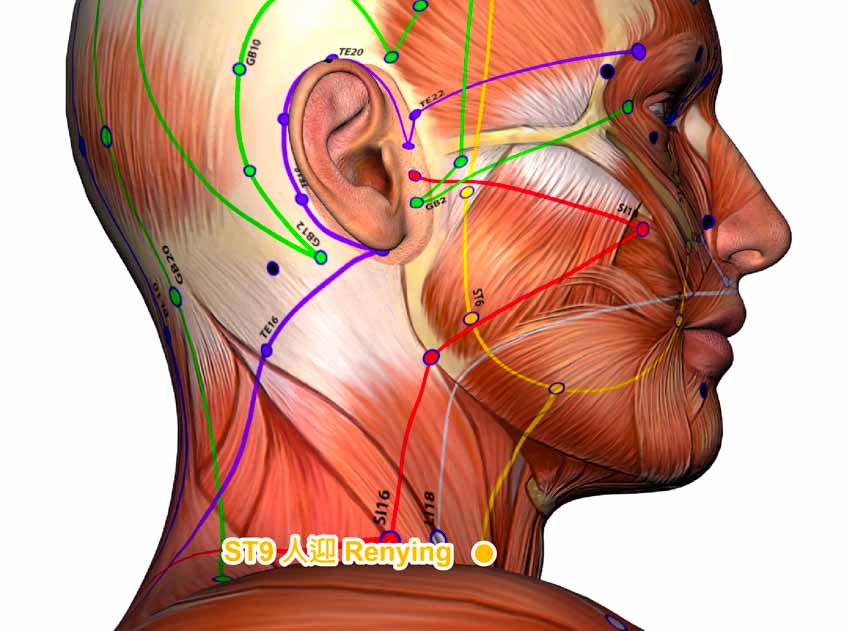
Acupuncture alleviates pharyngitis. Southwest Medical University hospital researchers conducted a clinical trial of 180 patients with chronic hypertrophic pharyngitis. Patients receiving acupuncture had significant reductions in pharyngeal mucosa congestion, globus sensations, itching, and dryness. [1]
Patients receiving only acupuncture had a 95.6% total effective rate. Patients receiving only Manyanshuning Qinghou Liyan granules, a Chinese herbal medicine, had a 67.8% total effective rate. Based on the data, acupuncture outperformed the herbal granules.
The sample size consisted of 180 patients admitted into the hospital. Patients were randomly divided into two groups of 90. For the acupuncture group, 57 were male and 33 were female. Age range was 16 to 68 years and mean age was 48.8 ±13.1. Average course of disease was 6.5 ±5.0 years. For the herb granule control group, 59 were male and 31 were female. Age range was 19 to 66 years and mean age was 48.4 ±13.2. Average course of disease was 6.2 ±4.8 years. The two groups were comparable; there were no statistical distinctions between them prior to treatments in the study.
Inclusion criteria consisted of congestion of the posterior wall of the pharynx, engorgement of vessels, thickness of pillars, increased mucus secretion, enlargement of lateral pharyngeal bands, elongated and hypertrophied uvula. Additionally, all patients fit into the phlegm and blood stasis differential diagnostic type, according to TCM (traditional Chinese medicine). Exclusion criteria consisted of pregnancy, high blood pressure, diabetes, coronary heart disease, coagulation dysfunction, harmful long-term exposure to dust, damage due to harmful gas exposure, gastroesophageal reflux disease, obstructive sleep apnea, hypoventilation syndrome, styloid process syndrome, and mental disorders.
For the acupuncture group, treatment was administered on alternate days for two weeks. Sterile filiform needles (0.5 cun to 1.5 cun in length) were inserted into the following acupoints:
- CV23 (Lianquan)
- CV6 (Qihai)
- ST36 (Zusanli)
- ST40 (Fenglong)
- LV3 (Taichong)
- LI4 (Hegu)
- ST9 (Renying)
- Ashi acupoints (retropharyngeal lymphoid follicles and lateral pharyngeal bands)
Needles were retained for 30 minutes after achieving a deqi sensation. Zusanli, Qihai, and Hegu points were also provided with warm needle acupuncture for 15 minutes. After a deqi sensation was obtained at Taichong, Fenglong, Lianquan, and Renying, needles at these points were connected to an electroacupuncture device, with an intermittent wave, for a duration of 30 minutes.
For ashi acupoints, 3–5 lymphoid follicle regions points were inserted. For lateral pharyngeal bands, needles should were perpendicularly and swiftly inserted to reach 1 mm below the skin surface. Slight bleeding should be observed. The control group; however, they were provided with Manyanshuning Qinghou Liyan granules, which were taken orally three times daily, for two weeks. The herbal medicine control group did not receive acupuncture.
Efficacy rate was calculated based on a symptom scoring system. Symptoms including pharyngeal mucosa congestion, globus sensations, itching, and dryness were scored. Outcome measures were classified into three categories:
- Recovered: symptoms disappeared or symptoms scores dropped by over 95%
- Significantly effective: symptoms scores dropped between 70% and 95%.
- Effective: symptoms scores dropped between 30% and 70%.
- Ineffective: symptoms scores dropped by less than 30%.
Within the acupuncture group, 10 cases recovered, 43 cases were significantly effective, 33 cases were effective, and 4 cases were ineffective, yielding a total efficacy rate of 95.61%. The herbal granule control group achieved a 67.8% total efficacy rate. Based on the findings, the researchers note that acupuncture is safe and effective for the alleviation of hypertrophic chronic pharyngitis. They note that based on TCM principles, acupuncture reduces phlegm, disperses obstructions, activates qi and the collaterals, and eliminates stagnation.
Reference:
[1] Efficacy Observation of Wenyang Tongluo Acupuncture Therapy on Hypertrophic Chronic Pharyngitis, ZHOU Xing-wei, WANG Jian, TONG Xin-ke, Shanxi Journal of TCM, May. 2021 Vol.37 No.5.


